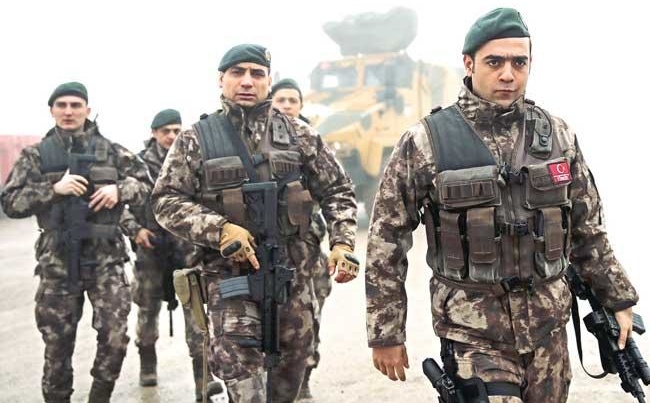Turkish special forces in Afrin in northwest Syria, February 2018
Local journalists in Afrin in northwest Syria have spoken of detentions and beatings by Turkish forces.
In one of the latest cases, Bilal Srewel was released last week after days in detention, reportedly with a black eyes, deep bruises on his legs, and cigarette burns down his back.
A media activist from East Ghouta who was displaced to the opposition-held northwest earlier this year, Srewel was photographing in the streets of Afrin when he was arrested by a fighter from the Turkish-backed rebel faction Sultan Murad Division, supposedly for taking photos without a permit.
An official from a rebel faction said the case is under investigation: “I assure you that the person who arrested him will be punished,”
But another media activist displaced to Afrin from southern Syria described repression in the area, taken by a Turkish-rebel offensive from Kurdish forces last spring.
“Honestly the situation for media workers is really sickening here,” says “Amer al-Raabi” — a pseudonym to protect against retribution — “[We] have distanced ourselves and kept our eyes off political and military issues. As journalists, we’ve started to feel oppressed and powerless.”
Soad Khobia of the pro-opposition Syrian Journalists Association, based in Turkey, said nine journalists have been detained and later released since January in and near Afrin city.
After Bilal Srewel’s release, SJA said in an official statement that violations committed by Turkish-backed armed factions in northern Syria “can no longer be ignored”. It called on the Turkish Government to hold the perpetrators accountable.
But media activists warn that detentions are likely to continue, as neither Turkish authorities nor police are recognizing permits that have been required since July for all journalists.
Asem al-Halabi, a photographer and reporter based in western Aleppo Province, says there is no uniform system of regulation on which journalists can count: “You can’t generalize and say that the media activists don’t have any freedom at all. But yes, there are red lines that no one can cross, and these lines differ from area to area and from faction to faction.”
Critics, including the UN and human rights groups, have reported looting, confiscation of property, arbitrary arrests, and even extra-judicial executions by armed factions.
Last week an alliance of local rebel groups, working with Turkish forces, launched a campaign against one faction accused of corruption and abuse of civilians.
Yesterday, civilians in Afrin staged a rare protest against the Turkish-backed SNA rebel formation, days after clashes between the SNA and Shuhuda a-Sharqiya in the northwestern rebel-held city 3/6 pic.twitter.com/WEZ4jzl4Fc
— Syria Direct (@SyriaDirect) November 22, 2018
Amid Turkey-Kurdish Tension, US to Set Up Observation Posts on Turkish-Syrian Border
The US is setting up observation posts on the Turkish-Syrian border, Defense Secretary Jim Mattis said on Wednesday.
Mattis said the posts will keep focus on defeating the Islamic State in Syria:
“We are putting in observation posts in several locations up along the Syria border, northern Syria border, because we want to be the people who call the Turks and warn them if we see something coming out of an area that we’re operating in.
But the move may also be related to recent tension over Turkish shelling of the US-backed, Kurdish-led Syrian Democratic Forces in northern Syria.
In late October Turkish forces bombarded positions of the YPG, the leading SDF faction, which Ankara considers part of the Turkish Kurdish insurgency PKK. The attacks were the first east of the Euphrates River, the heart of the Kurdish-controlled area of Syria.
Turkish President Recep Tayyip Erdoğan pledged, “We will destroy the terror structure east of the Euphrates.”
In response, the SDF briefly suspended its offensive against the remaining ISIS territory in eastern Syria.
Mattis tipped off the US intent that Turkey and the SDF refrain from further clashes: “What this is designed to do is to make sure that the people we have fighting down in the [middle Euphrates River Valley] are not drawn off that fight, that we can crush what’s left of the [ISIS] geographic caliphate.”
He said the posts will not require an addition to the 2,000 US troops in the country.
In another sign of the Turkey-Kurdish dynamic, outlets close to the Erdoğan Governments converted Mattis’s comments about an anti-ISIS initiative into the US military addressing “Turkey’s concerns over YPG“.

